“Asia Shipping, Greener Together”

On 28 May 2024, the International Shipping Forum of the Asian Shipowners’ Association (ASA), themed “Asia Shipping, Greener Together”, was held in Hong Kong during the ASA Annual General Meeting, hosted by the Hong Kong Shipowners Association (HKSOA). The event had more than 350 participants, including ASA delegates from different parts of Asia and HKSOA members and overseas guests. This is a report about the Forum.
Executive Summary
The 2024 International Shipping Forum opened with a positive welcome speech, delivered by Mr. Lam Sai Hung, GBS, JP, Secretary for Transport and Logistics. He noted the significant shift in shipping to Asia in the past decade, including fleet ownership, cargo shipments, ship building and maritime services. He emphasized that the Hong Kong SAR government’s recent action plan on maritime and port development shows the determination of public-private partnership to embrace the global green transformation. Following his speech, Mr. Angad Banga, JP, President of the Asian Shipowners’ Association and Chairman of the Hong Kong Shipowners Association, shared his thoughts on many shipping practices, pointing out that creating a greener maritime industry requires a multifaceted approach and innovative thinking. This includes supporting research in alternative fuels, developing advanced vessels, integrating digital technologies, industry-wide collaboration and cross-border partnerships.
This was followed by two keynote speeches. Mr. Arsenio Dominguez, Secretary-General of the International Maritime Organization (IMO), shared his vision for the IMO and the shipping sector – to build on their experience and expertise to make the organization and industry more diverse, inclusive and transparent. He strongly advocated maritime education, in terms of both educating the media and public about the industry to attract new talent, and building on the industry’s experience and expertise to help it adapt to our fast-changing world. He passionately addressed the geopolitical situation at sea, where innocent seafarers are at risk, highlighting that the IMO strongly condemned this. Finally, he reiterated the challenge of reaching net zero around 2050. All options must be considered, and investment is needed in both equipment and training.
In the second keynote speech, Mr. Guy Platten, Secretary-General of the International Chamber of Shipping, added to Mr. Dominguez’s statement, stressing the importance of speaking up in unison on behalf of almost 200 million seafarers around the world. Furthermore, he gave three clear elements in the industry’s green transition: alternative fuels, port infrastructure for the fuels, and a workforce trained to use them. To tackle the current problems, which involve cost and availability, Mr. Platten stressed the importance of an effective GHG pricing mechanism and then suggested de-risking investments needed to produce low- and zero-carbon emissions fuels; ensuring appropriate infrastructure at ports; aligning the energy-maritime value chain; and focusing on the entire world, not just the fuels shipping will use to decarbonise.
The keynote speeches were followed by panel discussions. The first was themed “Asia Shipping, Greener Together in Fuels, Technologies, Training and Development”. Professor Christine Loh, Director of the Global Maritime Forum, moderated the panel with interesting questions and follow- up remarks. The panel featured Mr. Tim Huxley, Chairman of Mandarin Shipping, Captain Lothair Lam, Vice Chairman of ASA Seafarers Committee, and Mr. Zhou Lu, Senior Surveyor of the China Classification Society. The panellists concluded that Asian shipowners have progressed in the green transition in recent years, with the LA-Shanghai shipping corridor project as stated by Mr. Lu. and the heavy investment of Captain Lam’s company in energy-efficient technology and dual-fuel vessels, for examples. The next step would be to agree on which alternative fuels to use and to work together to drive change rather than to have change forced on the industry, as passionately advocated by Mr. Huxley, who was pleased to see Asia becoming the clear global centre for ship owning, building and management.
The second panel discussion, themed “Asia Shipping, Greener Together in Regulation and Compliance”, was moderated by Ms. Tabitha Logan, Co-founder of the Young Professionals in Shipping Network. The panel consisted of Mr. Martin Cresswell, past Chairman of the Marine Committee of the International Chamber of Shipping, Mr. Arun Sharma, Chairman of the Asian Classification Societies, Mr. Keiji Tsuchiya, Vice President of The Japanese Shipowners’ Association and Mr. Wei Zhuang, Head of Asia Pacific of the Baltic and International Maritime Council (BIMCO). An advocate for green shipping, Ms. Logan raised issues about unified standards and pricing mechanisms for alternative fuels and levelling the playing field; the panellists agreed that to achieve the latter there must be a single global regulation system with some flexibility and a standard pricing mechanism. Mr. Martin Cresswell pointed out the importance of maintaining Asia’s leading position in innovation and technology, as Asia currently builds about 95% of world’s ships. Mr. Tsuchiya advised the audience that Japanese ship owners are committed to investing zero-emissions technologies, including carbon capture and storage and green fuels. Mr. Sharma mentioned the efforts of the Indian Register of Shipping to pursue the ratification of the “Hong Kong Convention” on ship recycling. And he called for more collaboration between the Asian regulators and classification societies. Mr. Zhuang expressed his concern about the lack of shipping knowledge among some regulators and policy makers, highlighting the BIMCO efforts to bridge these gaps.
In the Forum, the Asian maritime sector gave a loud and clear message to the global community that the industry must and will collaborate to address the many challenges and to find solutions in their green transition. Asia Shipping, Greener Together!
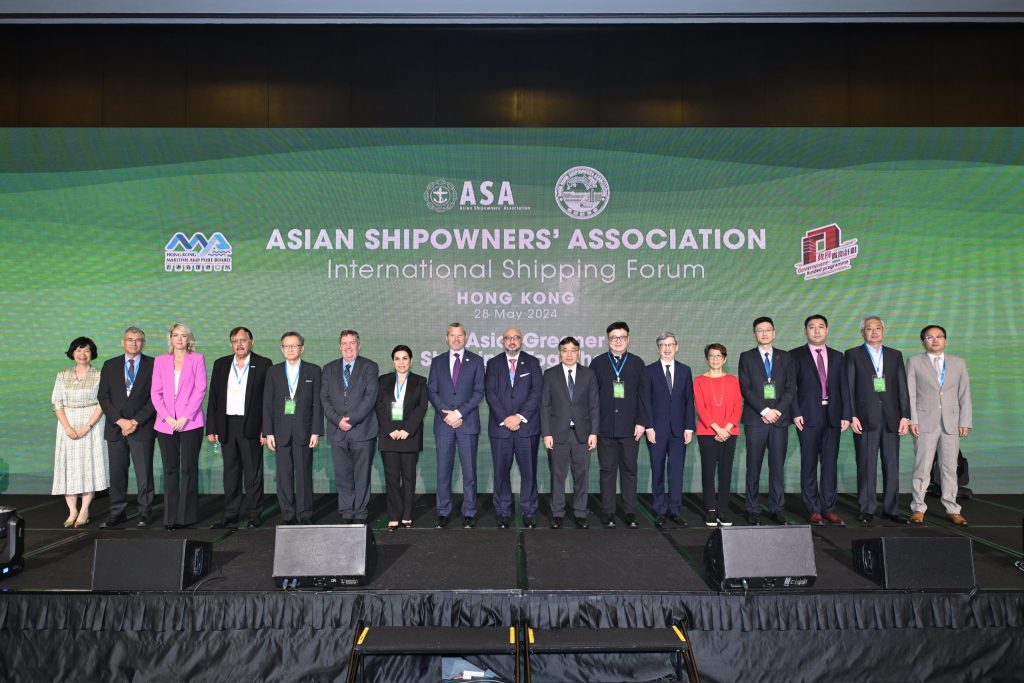
(from left) Sandy Chan, Mr Martin Cresswell, Ms. Tabitha Logan, Mr Arun Sharma, Mr Yuichi Sonoda (Secretary General of Asian Shipowners’ Association (ASA)), Mr. Guy Platten, Mrs Carmelita Hartoto (Vice President of ASA and Chairwoman of the Federation of the ASEAN Shipowners’ Association (FASA)) , Mr Arsenio Dominguez, Mr Angad Banga, Mr Lam Sai Hung, GBS, JP, Mr Wellington Koo, JP (Former President of Asian Shipowners’ Association and Past Chairman of Hong Kong Shipowners Association), Mr. Timothy Lee (Chairman of Manpower Development Committee of HKMPB), Prof Christine Loh, SBS, JP, OBE, Capt Lothair Lam, Mr Zhou Lu, Mr Keiji Tsuchiya, Mr Wei Zhuang
(左起) 陳佩珊女士, 祈敏鈿先生, Ms Tabitha Logan, Mr Arun Sharma, 亞洲船東協會秘書長Mr Yuichi Sonoda, Mr. Guy Platten, 亞洲船東協會副主席暨東盟船東協會聯盟(FASA)主席Mrs Carmelita Hartoto, Mr Arsenio Dominguez, Mr Angad Banga, 林世雄先生 GBS, JP, 前亞洲船東協會主席暨香港船東會前任主席顧之灝先生JP, 香港海運港口局人力資源發展委員會主席李國霖先生, 陸恭蕙教授SBS, JP, OBE, 林銘鋒船長,周璐先生, Mr Keiji Tsuchiya, 莊煒先生
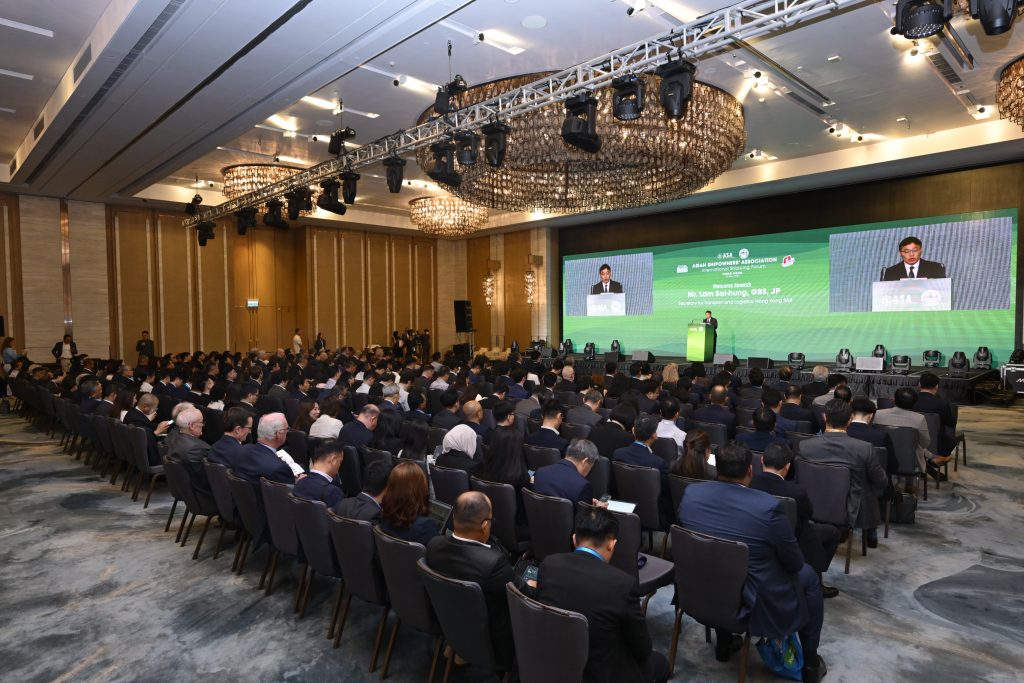
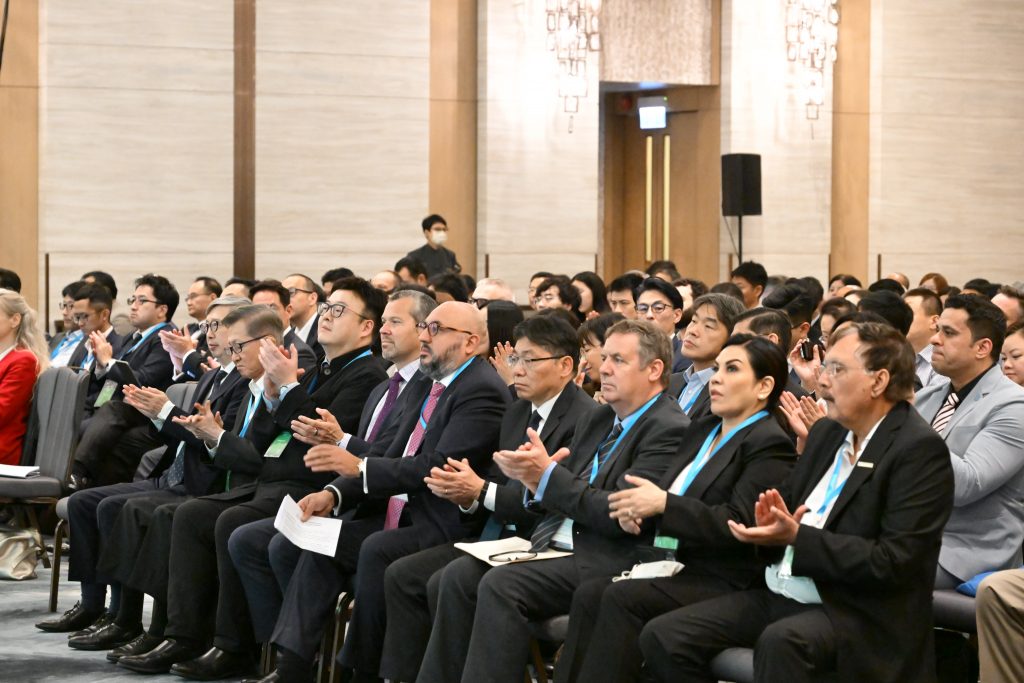
Attendance
Event Host
Ms Sandy Chan, Managing Director, Hong Kong Shipowners Association
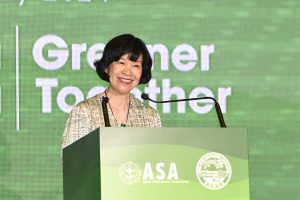
Ms Sandy Chan, Managing Director, Hong Kong Shipowners Association
香港船東會董事總經理陳佩珊女士
Speakers
• Mr Lam Sai Hung, GBS, JP, Secretary for Transport and Logistics, Hong Kong SAR Government
• Mr Angad Banga, JP, President of Asian Shipowners’ Association, and Chairman of Hong Kong Shipowners Association
• Mr Arsenio Dominguez, Secretary General, International Maritime Organization
• Mr Guy Platten, Secretary General, International Chamber of Shipping
Panellists
• Professor Christine Loh, Director, Global Maritime Forum
• Mr Tim Huxley, Chairman, Mandarin Shipping
• Captain Lothair Lam, Vice Chairman, Seafarers Committee, Asian Shipowners Association
• Mr Zhou Lu, Senior Surveyor, China Classification Society
• Ms Tabitha Logan, Co-founder, Young Professionals in Shipping Network
• Mr Martin Cresswell, Past Chairman, Marine Committee, International Chamber of Shipping
• Mr Arun Sharma, Chairman, Association of Asian Classification Societies, Executive Chairman, Indian Register of Shipping
• Mr Keiji Tsuchiya, Vice President, The Japanese Shipowners’ Association
• Mr Wei Zhuang, Head of Asia Pacific, Baltic and International Maritime Council
Welcome Speech
Mr Lam Sai Hung, GBS, JP, Secretary for Transport and Logistics, Hong Kong SAR
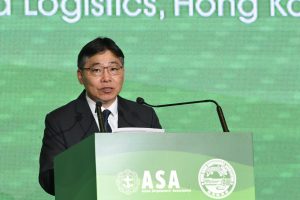
Mr Lam Sai Hung, GBS, JP, Secretary for Transport and Logistics, HKSAR and Chairman of Hong Kong Maritime and Port Board
運輸及物流局局長暨香港海運港口局主席林世雄先生 GBS, JP
Mr Lam pointed out that shipping is one of the most fuel-efficient and sustainable means of moving goods around the world, releasing only a fraction of the greenhouse gas emissions compared to other modes of transport, but because of its sheer size, it also creates a large amount of carbon emissions.
Mr Lam noted the significant shift in shipping to Asia in the past decade, including fleet ownership, cargo shipments, shipbuilding and maritime services.
In December 2023, the Hong Kong Government outlined 10 strategies and 32 action measures to consolidate and enhance Hong Kong’s position as an international maritime centre, he explained. The first strategy is to develop Hong Kong as a green shipping hub. The Government is conducting a comprehensive feasibility study on providing green fuel bunkering services for both local and ocean-going vessels to establish Hong Kong as a leading green maritime fuel bunkering centre, he said.
The maritime industry has immense potential for embracing green transformation, said Mr Lam. The Government will provide incentives, backed by about HK$65 million, for Hong Kong-
registered ships that attain high ratings under the international decarbonisation standards formulated by the IMO, demonstrating the government’s support for environmentally friendly shipping practices.
Opening Speech
Mr Angad Banga, JP
President, Asian Shipowners’ Association, Chairman, Hong Kong Shipowners Association
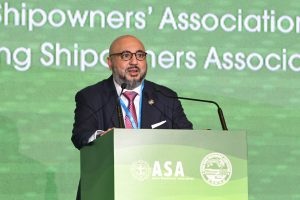
Today’s theme resonates deeply within the shipping industry and its shared commitment to sustainability, said Mr Banga. It is at the heart of the world’s economy, responsible for transporting 90% of global trade, and at the forefront of efforts to balance this vital role with protecting the environment.
Hong Kong’s comprehensive maritime services, encompassing ship financing, legal and arbitration services, ship management and marine insurance, along with its efficient port facilities, have cemented its position as a global maritime centre, said Mr Banga. But creating a greener maritime industry requires collective effort and innovative thinking.
“Reducing greenhouse gas emissions requires a multifaceted approach,” said Mr Banga, including the following
• Adopting alternative fuels, energy-efficient technologies and innovative operational practices
• Working closely with governments, regulators and international organizations to create a supportive regulatory framework that encourages innovation and investment in green technologies
• Establishing partnerships between the public and private sectors to finance and develop the infrastructure needed for sustainable shipping
• Establishing joint research and development projects, industry-wide collaboration and cross-border partnerships
• Developing advanced, zero-emission vessels
• Integrating digital technologies to optimise maritime operations
• Continuing to support research and development in alternative fuels, such as hydrogen and ammonia
Keynote Speech (1)
Mr Arsenio Dominguez, Secretary-General, International Maritime Organization
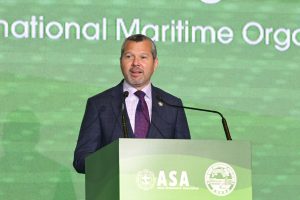
Mr Arsenio Dominguez, Secretary-General, International Maritime Organization
國際海事組織秘書長 Arsenio Dominguez 先生
• Vision for the IMO and shipping sector – build on our experience and expertise to make the industry and the IMO more diverse, inclusive and transparent
• Help the media and society understand shipping better to acknowledge its importance and to help attract future talent
• Among the opportunities and challenges facing Hong Kong are (1) its transition to a green shipping hub, (2) the promotion of Hong Kong as a brand, and (3) the grooming of maritime talent
• Key areas of work: (1) geopolitics and the safety of seafarers, (2) attracting new talent, and (3) decarbonisation
Mr Dominguez explained that his vision for the IMO and the shipping sector was to build on their experience and expertise to make the organisation and industry more diverse, inclusive and
transparent. He noted that the media tends to focus on the industry only when something goes wrong rather than when everything is going well, like during the COVID pandemic. “We were the only sector that continued to supply essential goods to everyone around the world,” he said. It’s important for the media and the public to better understand the shipping industry and acknowledge its importance to help the industry attract talent.
Mr Dominguez highlighted two key areas related to Hong Kong in the work of the International Maritime Organisation (IMO): Hong Kong’s transition to a green shipping hub and the promotion of Hong Kong as a brand, one goal of which is the grooming of maritime talent. He pointed out that the new generation has a different perspective about careers, and that the industry needs to address this to better understand their needs and adapt accordingly.
He then explained the key areas of work going forward for the IMO: geopolitics and the safety of seafarers, attracting new talent and decarbonisation. Geopolitics presents an additional challenge to all work of the IMO in addition to the challenges to the shipping industry, particularly in the Red Sea, where the lives of innocent seafarers are at risk while they are working to supply the world. The UN has condemned attacks on ships and the Maritime Safety Committee of the IMO is working with member states to focus on solutions, he said.
Attracting new talent is a challenge that is exacerbated by the situation in the Red Sea and other geopolitical situations, said Mr Dominguez. The industry therefore needs to look into the safety of seafarers. Another challenge is the training requirements for the green transition, he noted. There are several projects underway, and Hong Kong is focusing on grooming new talent.
The third challenge, and perhaps the most important, he said, is decarbonisation. “To get to net zero by around 2050, we need to focus first on 2030,” he pointed out, “and all options must be considered.”
There are many questions about which fuel to focus on, he noted. All options must be considered. Hong Kong, for example, is looking into being a hydrogen and ammonia hub. Other sectors that need these fuels must be involved because this green transformation is not just for shipping, but for everyone in the planet, he added.
Mr Dominguez concluded by addressing the cost implications of the green transition, since it will require new equipment, training and certification. We need to invest to continue to be greener, competitive and sustainable, and attract new talent, he said.
Keynote Speech (2)
Mr Guy Platten, Secretary-General, International Chamber of Shipping
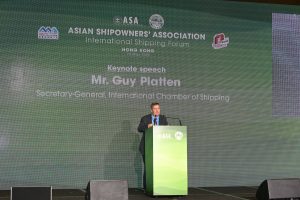
Mr. Guy Platten, Secretary-General of the International Chamber of Shipping
國際航運公會秘書長 Guy Platten 先生
• The shipping industry must speak up and be more vocal on behalf of seafarers
• There are three key elements in the shipping industry’s green transition: (1) the availability and competitive price of alternative, (2) port infrastructure to handle the fuels, and (3) a workforce trained to use them
• There are four current problems with new alternative fuels: (1) their development for shipping is too slow, (2) they are much more expensive than conventional fuels, (3) their availability is limited, and (4) there is little or no incentive for shipowners, operators and charterers to adopt them.
• Accelerating the production and uptake of new fuels will require: (1) de-risking investment for producing low- and zero-carbon emission fuels, (2) ensuring appropriate infrastructure at ports, (3) collaboration of all stakeholders to unlock the production, transportation and use of low-carbon fuels at scale, and (4) focusing on the whole world, not just shipping Mr Platten began by recognising seafarers and the difficult operating environment, with geopolitical instability putting their lives at risk for simply doing their job. “We must speak up and be more vocal for our seafarers,” he said.
He identified three key elements in the shipping industry’s green transition: (1) the availability and competitive price of low- and zero-carbon fuels, (2) port infrastructure to handle the fuels, and (3) a workforce trained to use them.
He commended the Hong Kong Government for its commitment to the industry’s green transition, particularly its ‘Action Plan on Modern Logistics Development’, which lays out strategies to build a green and smart port, strengthen high value-added maritime services, and encourage the industry to adopt more sustainable shipping practices.
Ports and shipping will be key players in achieving ambitious climate change targets for the entire world, he said. Shipping will play a vital role transporting a huge 50% of new green fuels for
governments and other sectors to use, which will only be possible with ports to provide the necessary bunkering and refuelling infrastructure. We must focus on catalysing the uptake for the fuels, he maintained.
Mr Platten listed several current problems with new alternative fuels: (1) their development for shipping is too slow, (2) they are much more expensive than conventional fuels, (3) their availability is limited, and (4) there is little or no incentive for shipowners, operators and charterers to adopt them.
At MEPC81 in March, the IMS proposed a flat rate contribution system per tonne of GHG to help achieve net zero emissions from shipping. This is receiving increasing support, he said. The aim of the IMS Zero Emission Shipping Fund proposal is: (1) to incentivise rapid production and uptake of zero GHG marine fuels and technologies, and (2) to provide billions of dollars to support the transition in developing economies.
Economic measures need to be put in place urgently to accelerate the production and uptake of these new fuels at a speed and scale never seen before, he said. “A GHG pricing mechanism can be adopted by 2025 and enter into force by 2027 to provide the industry with the certainty and guidance needed to achieve its decarbonisation goals.”
Achieving this will require: (1) de-risking investments needed to produce low- and zero-carbon emission fuels, (2) ensuring appropriate infrastructure at ports, (3) aligning the energy–maritime value chain, with all stakeholders collaborating to unlock the production, transportation and use of low-carbon fuels at scale, and (4) focusing on the entire world, not just the fuels shipping will use to decarbonise.
Innovation and advances in technology must not come at the cost of safety, and people must be at the core of all our decisions, said Mr Platten. A well-trained, diverse and motivated workforce is needed to deliver the ambitious goals to address the climate emergency. “Across the world there are approximately two million seafarers, with some projections suggesting that up to 800,000 will need upskilling training to deal with alternative fuel sources,” he added.
The Seafarer 2050 summit in Manila in June 2023 made it clear that a human-centred approach to decarbonisation is needed, he said. Governments and policy makers must understand the value of the seafarer workforce over other trades to secure investment in training and recruitment. This will require data gathering on an international scale and a redefinition of the social contract between seafarers and employers, he concluded.
Panel discussion (1)
“Asia Shipping, Greener Together in Fuels, Technology, Training & Development”
Moderator
• Professor Christine Loh, Director, Global Maritime Forum Panellists
• Mr Tim Huxley, Chairman, Mandarin Shipping
• Captain Lothair Lam, Vice Chairman, Seafarers Committee, Asian Shipowners’ Association
• Mr Zhou Lu, Senior Surveyor, China Classification Society
Aim
Cover the progression of the shipping industry’s green transition, discuss which alternative fuel is best to use and how to train seafarers.
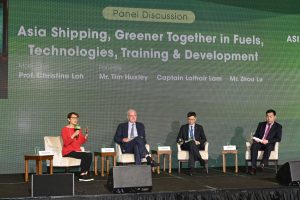
Discussion at a glance
• Asian shipping continues to be the world leader in both shipping and the green transition, but must work together with the IMO to drive change rather than have it forced on them.
• Mandating a single green fuel would reduce the cost of fuel and ships.
• Retraining is urgent for not just seafarers, but also shore personnel, ship management, shipbuilders, and so forth.
• Money for the green transition could come from government subsidies and grants and from high-tech public–private partnerships.
Summary
The theme of the first panel discussion was “Asia Shipping, Greener Together in Fuels, Technologies, Training and Development’.
How Asian shipowners are doing in the green transition
Captain Lothar Lam stated that as stewards of the oceans that connect Asia to the rest of the world, reducing their environmental impact is a top priority for Asian shipping companies.
“Shipping companies have a responsibility and a role to play in mitigating climate change and protecting the environment for generations to come,” said Captain Lam. “This is not only the right thing to do, but essential for the sustainable growth and long-term success of our businesses. The quest for greener fuel is paramount. Traditional marine fuels are increasingly being scrutinised for their environmental impact. Our industry must embrace alternative fuels such as LNG, methanol, ammonia, biofuel and hydrogen, which promise a significant reduction in greenhouse gas emissions.”
His company has retrofitted several ships with energy-efficient technology and invested in dual-fuel vessels and is exploring partnerships with fuel providers to ensure a steady supply of greener options.
Technology, from digitalisation to the development of smart shipping technology, is the backbone of a greener maritime industry, said Captain Lam, and there has been significant progress in recent years, enhancing efficiency, safety and environmental performance. His company has various cutting-edge technologies, such as real time data analytics, AI-driven decision-making systems, a Smart Carbon platform for ships to provide accurate measurement, and scientifically managing carbon emissions from shipping company operations.
Mr Tim Huxley said that Asian shipping was continuing to lead the field in shipping in general and in the green transition in particular, as it has done for a long time. As the clear global centre for ship owning, ship building and ship management, it’s important to maintain that position and drive the change so as not to have things forced on it by authorities and countries “that don’t have as much skin in the game as we’ve got here”, he said. The shipping community must work together to drive change, not to have it forced on them. “We really look to the IMO to actually make sure that happens,” he said.
Mr Zhou Lu introduced a project called the Los Angeles–Shanghai Green Shipping Corridor, established in September 2023, as an example of how different parties, such as ports, ship owners and carriers, can work together to make shipping safer and prevent pollution.
Mr Zhou added that similarly, shipowners, carriers, ports, product manufacturers and classification societies can work together to develop green technologies that meet international convention requirements, port requirements and government policies, with the benefit of established classifications and laboratories to verify the technology of the green fuels before they are used to ensure they are safe and conform to policies.
Which alternative fuel to use
Mr Huxley mentioned the importance of the “wonderfully fragmented” shipping industry working together but emphasised the need for a regulatory body “that is going to dictate what we’ve all got to do”. First, there must be agreement on which fuel to use, he said, with a date by which the change must be made by all parties. For example, one of the biggest shipowners in the world has staked its claim on conventional fuel, another has chosen LNG and yet another is 100% behind ammonia. This means Hong Kong would have to provide many different fuels to become a global bunkering centre.
Mr Huxley pointed to the importance of the incremental changes that ship owners have made and the fuel savings and reduced emissions that have resulted from technologies, most of which have been developed in Asia, like paint systems, propellers and the use of AI in voyage planning. But since the industry has so many different players, there is a need for a strong regulatory environment, he argued.
Mr Huxley said he preferred a single fuel to make it cheaper for everyone and so that shipyards can focus on building only ammonia-powered ships, for example, to reduce the cost of ships.
Captain Lam pointed out that shipyards in China, South Korea and Japan manufacture about 90% of the ships in the world and that Asia provides most of the world’s seafarers. He agreed with Mr Huxley that shipowners would prefer one fuel so as not to make a mistake of investing in the wrong fuel. So governments must take the lead, he maintained. The private sector cannot do it on its own.
Retraining
Professor Loh asked how 800,000 seafarers will be retrained by 2030.
Mr Huxley pointed out that it was not just the people on board ships who needed to be retained, but also ship management, shipbuilders, and so forth. A new generation of talent is needed who are fully up to speed on AI. This will require the shipping industry “to go out and sell its wares as a vibrant, critical, exciting, technologically advanced business that people should get into.” It’s going to be an enormous challenge to train so many people to handle different fuels, he said, and the targets are ambitious, but we should not worry too much about missing some of them. The UK, for example, has pushed back all its targets because it can’t afford them.
Mr Huxley mentioned one of the big problems with electric cars, for example, is that they’re not really green when you take into account the power required to make them, disposing of lithium batteries, and so forth. In shipping, in contrast, there has been much more progress because it is addressing some of the root causes, it is on the right track, and everyone is focused on it.
Captain Lam agreed that there is significant need retrain not just seafarers, but also shore personnel with the necessary knowledge and skills to operate and maintain the new technology and deal with the new regulations, not just alternative fuels. Designing the training programmes will require the cooperation of the government marine administration, private institutions and private shipping companies. He added that if there are many alternative fuels, ships will have to have separate crews trained for each fuel.
Mr Zhou mentioned the importance of training for ship crews for dealing with fires on vessels using battery power and government firefighting support. This would require the cooperation of shipowners, operators, training organisations and the government.
Money for the transition to green shipping
Captain Lam suggested two options to finance the transition to green shipping: (1) government subsidies and grants for investing in green technologies, infrastructure and fuels; and (2) high tech public–private partnerships.
Mr Huxley argued that the government will not subsidise shipowners. He acknowledged the unfairness, since the shipping industry is being asked to shoulder the entire cost of the green transition, while electric cars and solar power are subsidised. This may result in a delay in the transition, he said, which is why incremental savings are so important, since they are not nearly as expensive as retrofitting a ship with a methanol engine or building a new ship. This expense is one of the reasons ship owners have slowed down ordering ships, as they don’t know what they should order.
Panel discussion (2)
“Asia Shipping, Greener Together in Regulation and Compliance”
Moderator
• Ms Tabitha Logan, Director of Projects, Cetus Maritime, and co-founder, Young Professionals in Shipping Network.
Panellists
• Mr Martin Cresswell, former Chairman, Marine Committee, ICS
• Mr Arun Sharma, Chairman, Association of Asian Classification Societies (ACS), and Executive Chairman, Indian Register of Shipping (IRS)
• Mr Keiji Tsuchiya, Vice President, The Japanese Shipowners’ Association (JSA)
• Mr Wei Zhuang, Head of Asia Pacific, BIMCO
Aim
To highlight some of the initiatives in the Asian region and to look at its unique position in terms of how we can also collaborate and contribute to the green transition.
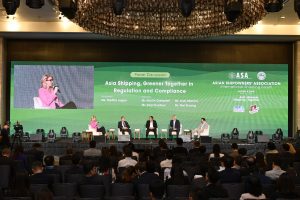
Discussion at-a-glance
• There must be a single global regulation system to simplify matters, but there should be a certain amount of flexibility.
• A simple pricing system and rules are needed, which the general public can easily understand, since the extra costs are going to be passed on to the general public in the end, and they are already very sensitive about inflation.
• Asia is building about 95% of the world’s ships and although some of the major components are designed in Europe, there is a tremendous amount of knowledge transfer from designers to builders.
• Since about 80% of seafarers are from Asia, the training knowledge will be in Asia as well.
Summary
Developing unified standards
Mr Arun Sharma explained that with respect to green shipping all the operational and design issues have been addressed, but the technology of fuels and training will be more difficult.
The Asian regulators and classification societies need to collaborate so that there is one set of regulations globally to simplify matters. The regulators must be strict, but they should provide a certain amount of flexibility to the classification societies, so that they can help the owners see that the shipping moves flawlessly through this complex scenario. One of the finest examples was how shipping, though very regulated, moved seamlessly during the pandemic. The IRS did not see a single mishap, yet delivery was flawless.
Mr Keiji Tsuchiya said that JSA members were committed to investing in zero emissions technology, in accordance with the Japanese announcements in 2021 to reach net zero GHG emissions by 2050. This commitment includes carbon capture and storage, and ammonia and advanced hydrogen fuels. A global standard for treatment of fuels such as ammonia should be adopted, he added.
Mr Sharma said there was tremendous apprehension among Indian recyclers about whether India should ratify the Hong Kong International Convention for the safe and environmentally sound recycling of ships, but the IRS took the lead to convince some of the biggest recyclers and cash buyers of scrapped ships to show them the benefits of the ratification of the Hong Kong Convention. It used to be very unsafe for both the workers and the marine environment, but when the recyclers understood the necessity of recycling ships in a way that is safe for both workers and the environment, they came along. Now almost 120 shipyards have a certificate of compliance with the Hong Kong Convention. and the IRS has certified about 22 yards in India, three yards in Bangladesh and one yard in Bahrain. So ship recycling has come a long way. At the request of the recycling yards, the IRS also trains the yards how to recycle safely, and trains workers how to use safety equipment, about healthcare, etc.
Mr Martin Cresswell said the HKSOA is basically working on three levels. Locally, it is working with the Hong Kong government to make Hong Kong a green port by making green fuels available in Hong Kong. Secretary for Transport and Logistics said that things will start moving ahead in the next year. Regionally, the HKSOA is talking with the Mainland, which builds more than 50% of the world’s ships and controls about 16% of the world’s ships. And internationally, the HKSOA is working closely with the ICS, which is a collaboration of about 26 countries and shipowners associations. So getting all the shipowner associations together, the people who operate the ships, is extremely useful. This is where the ICS has inputs for the IMO, because it is an NGO in the IMO, so it can influence what’s going on in the IMO.
Mr Wei Zhuang acknowledged the decarbonisation challenge and said BIMCO is fully aware of the pain, frustration and wish lists of the shipping companies. First, BIMCO is raising the concerns of shipowners, managers and operators because they are the backbone of the shipping industry. And second, it is maintaining a dialogue with the regulators, not only IMO, but also the regional regulators. BIMCO is deeply concerned about the lack of shipping knowledge among some regulators and policymakers. Either they don’t understand some issues or they ignore them. This creates a lot of challenges for the shipping industry. One example is the EU ETS, which frustrates many Asia-based shipowners. And this has a ripple effect to shipping managers and charterers. So BIMCO is working harder to maintain dialogue with them. Third, BIMCO tries to bridge the gap regarding different standards for fuel, etc., to reflect the practical concerns of the shipping industry to regulators and policymakers.
Mr Tsuchiya said that having many regional regulations that affect global shipping is unacceptable. The JSA recommends that same rules and regulations apply on all routes and in all ports, allowing all ships to operate under the same conditions.
Mr Sharma said that a single global regulation system is a must, but that there should be flexibility in following the regulations. Good, strong regulations have resulted in a dramatic reduction in major shipping casualties, such as fires, groundings and collisions, in the past 20–30 years. he said. For this, we can thank the regulator’s, especially the IMO.
Pricing mechanisms for alternative fuels and levelling the playing field.
Mr Martin Cresswell pointed out some of the difficulties in levelling the playing field in terms of fuel pricing. Large shipping companies can pass the increased costs on to the consumer, especially with container and passenger shipping, but it’s much more difficult for small companies or bulk carriers. So a very simple system and rules are needed, which the general public can understand since these costs are going to be passed on to the general public at the end of the day. People have been very upset about inflation in the past few years, so handling this is going to be critical. A sensible pricing mechanism is needed. The IMO is trying to come up with rules by 2027, for implementation in 2028. It’s complex, but they need to come up with a simple solution that everybody around the world can understand.
Ms Logan agreed that raising public awareness of how crucial the shipping industry and the supply chain is key.
Mr Sharma said it is too early to talk about the cost of the new fuels. Targets have been established for 2030, 2040 and 2050, and the intent of stakeholders to meet those targets is strong, but reality is different. “What is really important is that today, we are talking only about interim fuels, such as biofuels and LNG, which are actually being used in certain areas of shipping. But when you look at ammonia, methanol, hydrogen and green hydrogen, the seascape is still very hazy. Some very knowledgeable people have stated that the transition to these fuels will be not overnight; it will come in waves. So fossil fuels will be phased out only gradually. As for the cost, some shipping economists in the UK have pointed out that there will be strong competition for ammonia from the shore-based fertiliser and food industries, and that shipping will find it very difficult to get even “a whiff of ammonia”, when it is made available. So the cost part though very important, but it will take time to determine the cost and availability of each, he said.
Maintaining Asia’s leading position in innovation and technology.
Mr Cresswell noted that Asia is building about 95% of the world’s ships. The main engine is designed in Europe, but since they are being built in Asia, there’s a tremendous amount of transfer of knowledge from designers to builders, he said. It is the same with other systems, such as fuel transfer systems and ship-tank systems. So this knowledge will become more and more positioned in the shipbuilding nations in Asia.
Since about 80% of all seafarers come from Asian countries, there is a huge education requirement here now. But once all the seafarers have been trained, most of the training knowledge is going to be in Asia as well. “It is a bit concerning that the rest of the world is not keen on building commercial merchant ships, training seafarers, etc.,” he said.
Building a ship in non-Asian countries may now cost several times what a normal merchant ship would cost. Also, many countries have lost their knowledge about building merchant ships, making it very difficult to restart commercial shipbuilding to compete with Asian shipbuilders, he added.

